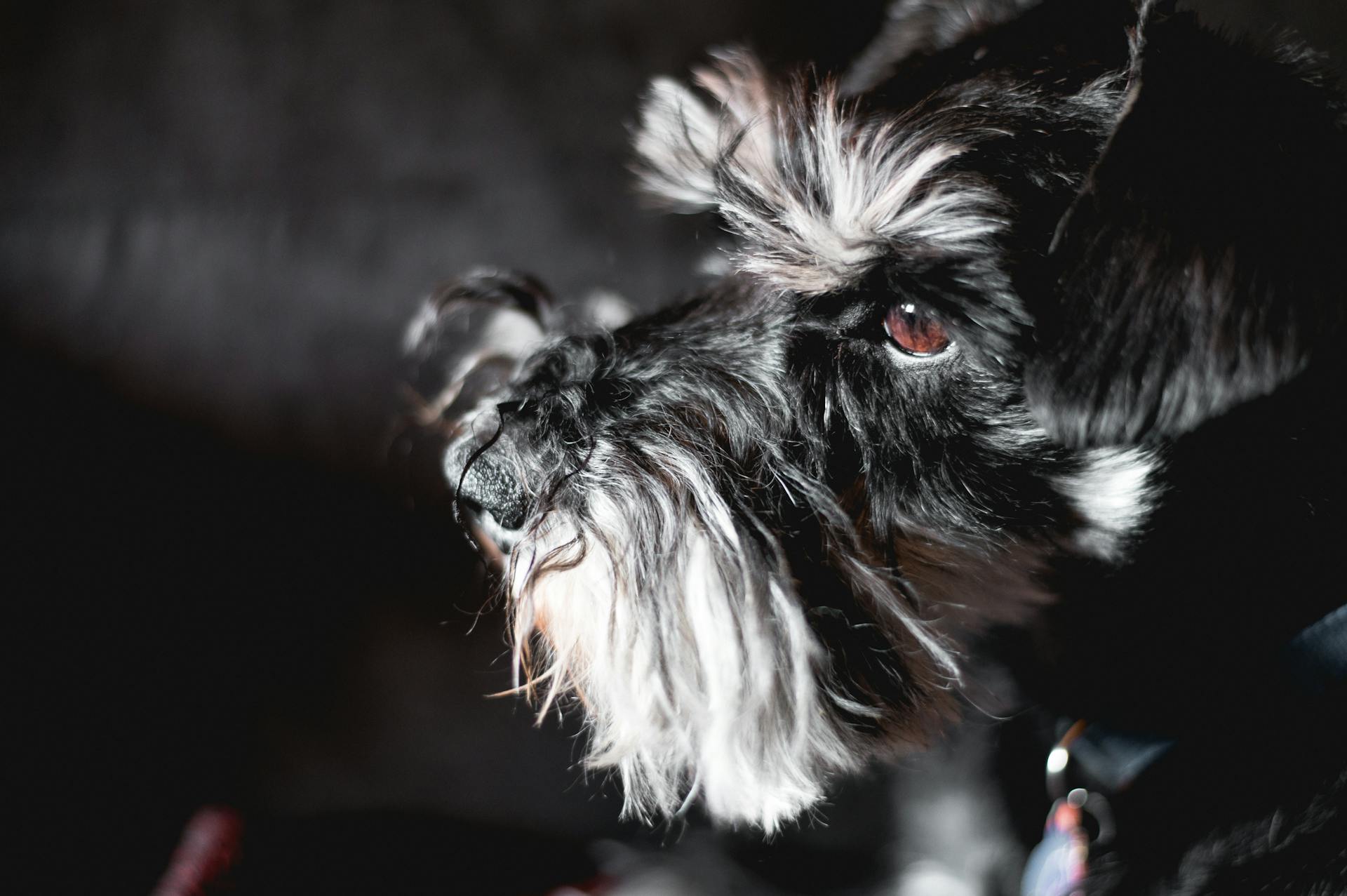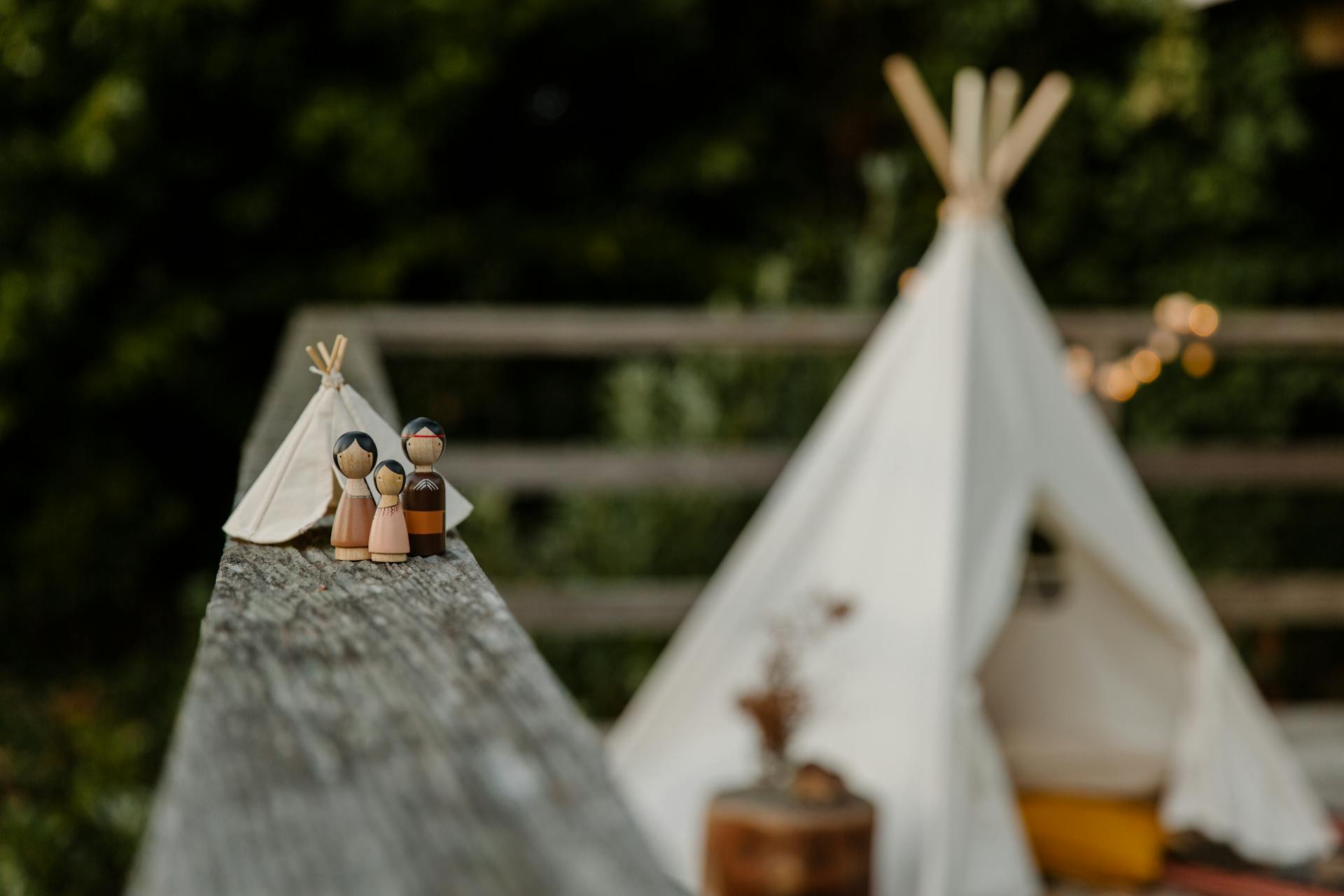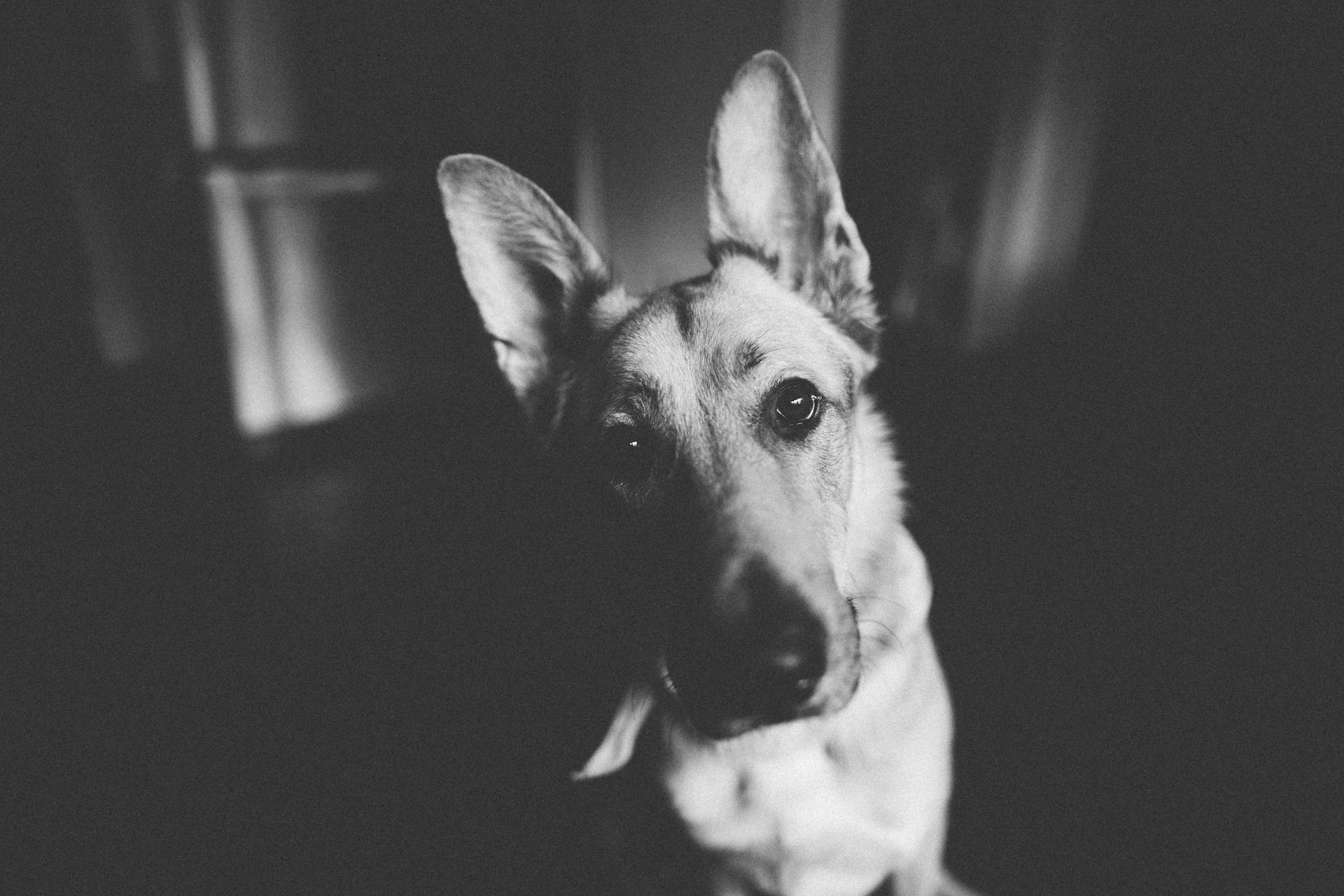
Training a Miniature Schnauzer requires consistency and patience. You can start training your Miniature Schnauzer as early as 8 weeks old.
Miniature Schnauzers are intelligent dogs and respond well to positive reinforcement. They are known to be stubborn at times, so be prepared to use calm and assertive commands.
Housebreaking is a crucial part of training a Miniature Schnauzer. They have small bladders and can't hold their urine for long periods, so regular potty breaks are essential.
Miniature Schnauzers are naturally protective of their family, so socialization is key to teaching them to interact with strangers and other animals.
Getting Started
Staying positive is key when training your Miniature Schnauzer. It's essential to train in a distraction-free environment and a good mood to get the best results.
Miniature Schnauzers are highly motivated by play, so use play as a reward to keep them engaged and focused. This way, you can avoid overfeeding your dog.
Keep training sessions short, around 5 to 10 minutes, especially when starting out with your puppy. Puppies can start learning basic commands at around 8 weeks old.
Ending each session on a positive note is crucial. Revisit a trick or command your dog has already mastered and give them plenty of praise to keep them motivated and eager for the next session.
Training Fundamentals
Miniature Schnauzers are quick learners and eager to please their owners, making them a joy to train. They can be quite fastidious, which usually makes them house train relatively easily.
Establishing good bathroom habits from a young age is key, as this is the easiest way to house train your Miniature Schnauzer. You can use a crate or supervise your dog to capture when they need to go for a potty break.
Miniature Schnauzers thrive on human companionship and can be prone to separation anxiety if left alone for long periods, so be sure to provide plenty of attention and positive reinforcement.
Understanding Miniature Schnauzers
Miniature Schnauzers are known for their intelligence, loyalty, and playful nature. They are quick learners and are eager to please their owners.
However, they can also be stubborn and independent at times. This means you'll need to be patient and consistent in your training approach.
These dogs thrive on human companionship and are highly social. They can be prone to separation anxiety if left alone for long periods.
Positive reinforcement training methods are particularly effective for this breed, as they respond well to rewards and praise. With the right approach, you can help your Miniature Schnauzer become a well-behaved and loyal companion.
Basic Tips
Reward your dog with treats, praise, and toys when they respond correctly to commands. This positive reinforcement helps them associate good behavior with positive outcomes.
Be patient and supportive during socialization, introducing new situations calmly and gently. This helps your dog feel comfortable and secure.
Use treats, praise, and toys to reinforce calm and friendly behavior during socialization. This helps your dog associate new experiences with positive outcomes.
Provide attention and rewards when your dog responds appropriately to commands, such as sitting or staying. This encourages them to repeat the desired behavior.
Consider reading: When Do Miniature Schnauzers Stop Growing
Positive Reinforcement
Positive reinforcement is a powerful training tool that involves rewarding your Miniature Schnauzer for good behavior. This can include treats, praise, toys, or a favorite activity.
Miniature Schnauzers respond well to positive reinforcement, making it a particularly effective method for training this breed. Reward good behavior with treats, praise, or toys to encourage your dog to repeat the behavior.
Positive reinforcement will strengthen the bond between you and your Miniature Schnauzer and make training a more enjoyable experience for both of you. Use positive reinforcement to reward your dog for calm and friendly behavior during socialization.
Treats, praise, and toys can help your dog associate new experiences with positive outcomes. Be patient and supportive as you introduce your Miniature Schnauzer to new situations.
To reinforce desired behavior, reward your dog with treats or toys and attention when they respond appropriately to commands. This will help them learn and remember what behavior is expected of them.
Here are some ways to use positive reinforcement effectively:
- Reward good behavior with treats, praise, or toys.
- Use your dog's name positively when calling them for food, exercise, or attention.
- Avoid using your dog's name when telling them no, as this can make them slow to respond.
Training Sessions
Keep your training sessions short and sweet, especially when it comes to young Miniature Schnauzers. Even an 8-week-old puppy can start learning, but be sure to adjust the session length according to their age and maturity level.
To keep your dog engaged, start with simple requests and short sessions. Young dogs can only focus attention for a short period of time, so work within your dog's limits.
Positive reinforcement is key in training, so be sure to reward good behavior with treats, praise, or toys. This will not only encourage your dog to repeat the behavior but also strengthen the bond between you and your Miniature Schnauzer.
Keep Sessions Short
Keep sessions short, especially with young dogs. Young dogs can only focus attention for a short period of time, so work within your dog's limits.
Start working with your Miniature Schnauzer as soon as possible, even at 8 weeks old. Adjust training sessions to be age-appropriate for your dog's maturity level.
Consider reading: Short Haired Schnauzer
Keep training sessions short for young dogs, as they can get overwhelmed easily. This will help prevent frustration and keep your dog engaged.
Use short sessions to your advantage by ending on a positive note. This will keep your dog looking forward to the next session and eager to learn.
Agility
Agility training is a great way to provide physical exercise and mental stimulation for your Miniature Schnauzer. Miniature Schnauzers are energetic and intelligent dogs that excel in agility training.
To get started, you can set up a basic agility course with obstacles like tunnels, jumps, and weave poles. Positive reinforcement and plenty of praise will motivate your dog to excel.
Miniature Schnauzers can benefit from agility training, which can strengthen your bond and challenge their agility and obedience skills.
Scent Work
Scent work is a great way to mentally stimulate your dog and encourage natural behaviors.
Start by hiding treats or toys in a designated area and encouraging your dog to use their nose to find them.
This activity can be enjoyed both indoors and outdoors, making it a versatile option for any dog owner.
Gradually introduce more challenging scents, such as essential oils or specific objects, to keep your dog engaged and stimulated.
Reward your dog for successful searches to build their confidence and reinforce good behavior.
Socialization and Interaction
Socialization is key to raising a well-adjusted and friendly Miniature Schnauzer. Proper socialization helps develop good manners and builds confidence.
Start socializing your Miniature Schnauzer from a young age and continue throughout their life to ensure they are well-adjusted and friendly. This will help prevent aggression, fearfulness, and other behavioral problems.
Arrange playdates with friends' dogs, visit dog parks, or enroll your dog in obedience classes to provide opportunities for positive interactions with other canines.
Socialize
Socialization is key to raising a well-adjusted and friendly Miniature Schnauzer. Socialization helps your dog develop good manners, build confidence, and learn to interact positively with people and other animals.
Start socializing your Miniature Schnauzer from a young age to set the foundation for a lifetime of good behavior. Proper socialization can prevent aggression, fearfulness, and other behavioral problems.
Socializing your Miniature Schnauzer exposes him to a variety of situations, keeping his mind busy and engaged, and preventing boredom and bad habits. This is especially important for Miniature Schnauzers, who are known to be vocal dogs and may bark excessively if not properly trained.
To address excessive barking, identify the triggers and work on desensitizing your dog through positive reinforcement. Teach your Miniature Schnauzer the “quiet” command by rewarding them for silence and redirecting their attention to a more appropriate behavior.
Socializing your Miniature Schnauzer with other dogs is essential for teaching them appropriate social behaviors and communication skills. Arrange playdates with friends’ dogs, visit dog parks, or enroll your dog in obedience classes to provide opportunities for positive interactions with other canines.
Socialization is an essential aspect of training for all dogs, including Miniature Schnauzers. By socializing your Miniature Schnauzer, you'll strengthen the bond between you and your dog, making training a more enjoyable experience for both of you.
Curious to learn more? Check out: Miniature Schnauzer Behavior Problems
Digging
Digging is a natural behavior for Miniature Schnauzers that can become problematic if left unchecked.
Providing alternative outlets for your dog's energy is key to discouraging digging. Interactive toys, puzzles, and playtime can keep your Miniature Schnauzer engaged and satisfied.
Designating a specific area in your yard with loose soil or sand can satisfy your dog's digging instincts, redirecting the behavior from unwanted spots to a controlled environment.
This approach has worked for many Miniature Schnauzer owners who have successfully redirected their dog's digging behavior with the right combination of exercise, mental stimulation, and designated digging areas.
Establish a Routine
Establishing a consistent routine is essential for training a Miniature Schnauzer. Miniature Schnauzers thrive on routine, so it's crucial to establish a schedule for potty breaks.
Take your dog outside first thing in the morning to relieve themselves. This sets the tone for the day and helps your dog learn to associate the outdoors with going potty.
For your interest: Dog Potty Training Crate
After meals, provide an opportunity for your dog to go potty within 15-30 minutes of eating. This helps prevent accidents and reinforces good behavior.
Before bedtime, take your Miniature Schnauzer outside one last time to prevent accidents during the night. Consistency is key, so stick to this routine even on weekends and days off.
Here's a schedule to follow:
By following this routine, you'll be well on your way to house training your Miniature Schnauzer. Remember to praise and reward your dog when they go potty outside to reinforce good behavior.
Common Challenges
Training a Miniature Schnauzer can be a rewarding experience, but it's essential to be prepared for common challenges that may arise along the way.
One of the most significant challenges you'll face is the Miniature Schnauzer's independent nature, which can make training a bit more difficult than with other breeds.
Housebreaking can be a challenge, especially if you're new to dog ownership. Understanding the importance of consistency and patience in this process will help you navigate it with confidence.
Be prepared for your Miniature Schnauzer to test boundaries and push limits, but with effective training, you can teach them to respect rules and boundaries.
Stubbornness
Miniature Schnauzers are known for their independent streak, which can sometimes manifest as stubborn behavior. This means you may encounter unresponsive or resistant dogs during training.
Stubbornness can be a major challenge in training your Miniature Schnauzer, but it's not insurmountable. With the right approach, you can encourage your dog to cooperate and respond positively to training.
One effective way to tackle stubbornness is to use high-value treats to motivate your dog. These treats can help break through the stubbornness and get your dog excited about learning.
Breaking down commands into smaller steps is another key strategy for overcoming stubbornness. This approach helps your dog understand what's expected of them and builds their confidence.
Consistency is crucial when dealing with stubborn Miniature Schnauzers. Stick to your training plan and avoid changing your approach mid-session, as this can confuse your dog and make the problem worse.
With patience and persistence, you can help your Miniature Schnauzer overcome stubbornness and become a well-behaved and loyal companion.
Leash Pulling
Leash Pulling can be a real challenge for both you and your dog. Some Miniature Schnauzers may exhibit leash pulling behavior while on walks.
The good news is that leash pulling can be addressed with positive reinforcement. To start, reward your dog for walking calmly by your side.
Gradually increase the distance and duration of loose leash walking to help your Miniature Schnauzer get the hang of it. Use rewards, praise, and patience to encourage good behavior.
Remember, teaching your dog to walk politely on a leash without pulling takes time and practice.
Broaden your view: Are Miniature Schnauzers Good Dogs
Chewing
Chewing is a common behavior issue among Miniature Schnauzers, especially puppies. To prevent destructive chewing, provide your dog with appropriate chew toys and bones to redirect their chewing behavior.
Supervise your Miniature Schnauzer closely to catch them in the act and correct them gently when they chew on inappropriate items.
Frequently Asked Questions
How do you discipline a Miniature Schnauzer?
Discipline a Miniature Schnauzer positively and consistently with rewards for good behavior. Consistency is key to effective training.
What age do Miniature Schnauzers calm down?
Miniature Schnauzers typically calm down between 12-18 months of age, but individual temperaments may vary. Understanding their energy levels and needs during this period is crucial for a happy and well-adjusted adult dog.
At what age can you start training a Miniature Schnauzer?
Miniature Schnauzers can start learning leash training as early as 8 weeks old. Early training helps establish good habits and a strong bond between you and your dog.
Sources
- https://wagwalking.com/training/train-a-miniature-schnauzer
- https://www.hepper.com/how-to-train-a-miniature-schnauzer/
- https://www.mini-schnauzer-secrets.com/litter_training.htm
- https://schnauzerfun.com/the-ultimate-guide-to-training-a-miniature-schnauzer/
- https://schnauzerfun.com/the-easy-training-guide-for-miniature-schnauzers/
Featured Images: pexels.com


